 By Sara Pitcher
By Sara Pitcher
Noblesville, Indiana Divorce Lawyer
In this age, it should be no surprise that technological advances are having impacts on countless areas of life that were, in the past, totally devoid of any involvement with technology.
This holds especially true for family law cases where social media evidence is increasingly being used in court.
The explosion of social networking coupled with the portability and accessibility of technology has caused trouble for many divorcing men and fathers going through divorce and child custody disputes.
With smart phones, tablets, and laptop computers becoming so popular, social networking sites are literally right at our fingertips throughout the day.
The availability and popularity of social networking sites has lead to many people posting details of their personal lives that were previously kept secret, or at least was only shared via phone calls or visits with close friends and not spread through the Internet to millions of people with the click of a button.
With this wide distribution of personal information, comes traceable physical evidence of your thoughts and actions posted by you and shared publicly with your “friends.”
Status Updates
Printouts of social networking profiles and pictures have become popular evidence in divorce and child custody cases.
The postings and musings of people as status updates are admissible in court as a public statement, even if the poster attempts to limit the publicity of the post by making it viewable only to their “friends.” This is because the statement was written and posted with the intent to be shared and it is well known that it may be shared with others who were not the intended audience.
Photos
Pictures, even if posted by others, are also admissible. The statement, “a picture is worth a thousand words,” holds especially true when it is admitted and shown to the judge to attack the credibility of the witness or party.
The picture may also be worth more than words if you are forced to pay a divorce attorney to try to argue to keep the picture out of court or rehabilitate your credibility and character if a damaging photo is admitted.
A parent may testify that they never drink alcohol. A recently dated photograph uploaded to a social networking site showing an alcoholic beverage in the hand of the parent, even with no children around, can destroy the credibility of the parent. If she was willing to lie about drinking, what else is she capable of lying about?
Related Article:
Dating Websites
While the dangers of posting thoughts to the current popular social networking sites such as Facebook and Twitter may be obvious to some, there are dangers of posting information on other websites as well.
Posting information on dating websites, such as answering some common questions about whether you have children, may pose some problems for your child custody case if you are less than honest. Waiting until after your divorce or custody case has ended to visit and post on dating websites would be best.
Professional Networking Websites
Another type of site that many people may not think to remove their information from at the beginning of a divorce is a professional networking site, such as LinkedIn.
These sites include information such as whether you are currently seeking employment or interviews and the type of position you are seeking. This information may be relevant in your divorce case if you are arguing for alimony, spousal maintenance, or other income and employment-related issues.
Use Social Media To Your Advantage
So if the opposing party is a social networking butterfly, it may work in your favor by giving you additional ammunition in your case against her.
Just be sure to avoid similar problems in your own case by avoiding posting online during the pendency of your case, or better yet, delete your accounts and remove your profiles from the Internet while the case is pending.
Log Off
 In order to ensure that you do not inadvertently provide the other party with additional evidence or information, the best thing you could do would be to immediately close all of your accounts on social networking, dating, and other websites that provide others with personal information about yourself at the very beginning of your case.
In order to ensure that you do not inadvertently provide the other party with additional evidence or information, the best thing you could do would be to immediately close all of your accounts on social networking, dating, and other websites that provide others with personal information about yourself at the very beginning of your case.
If you are not willing to go to that extreme, at least review all information currently viewable and available online and, if you have a divorce attorney, allow them to look over your profiles to see what information should be removed.
After that, make sure you are not posting any new information and continually review the information that your friends are posting about you or to you. If any of that content should be removed, do so immediately.
Unfortunately, remember that once something has been posted on the Internet, it can never be completely removed and you never know who has seen it or made copies of it before it was removed.
Thus, your best bet is to not allow it to be posted in the first place.
Remember, revealing too much on the Internet is listed as one of “The 10 Stupidest Mistakes Men Make When Facing Divorce,” according to Joseph Cordell’s book.
Cordell & Cordell has divorce lawyers for men located nationwide.
 To arrange an initial consultation to discuss divorce rights for men with a Cordell & Cordell attorney, including Noblesville, Indiana Divorce Lawyer Sara Pitcher, contact Cordell & Cordell.
To arrange an initial consultation to discuss divorce rights for men with a Cordell & Cordell attorney, including Noblesville, Indiana Divorce Lawyer Sara Pitcher, contact Cordell & Cordell.


Having been a custody evaluator for 10 years in the family courts in Texas, I can say that this information is absolutely correct. I even blogged about it myself a while back. Over the past few years, I have been swayed by images or other information found on social media sites. It’s especially telling when one lies about something just to find a picture or comment to the contrary on facebook. Having someone tell you they would never talk badly about the other parent just to run across comments such as “egg” or “sperm” donor — or worse — is a perfect example of things I’ve run across. I’m not sure just deleting the accounts will do a lot of good though. Attorneys are now subpoenaing records for social media sites, so there’s still a chance this info can be obtained. And at least one attorney has been sanctioned for advising their client to delete information. (I’m not an attorney but to the best of my knowledge the reasoning was that this was tampering with evidence. Feel free to correct me if this is incorrect.) Just blocking a person is no guarantee they won’t get it some other way. The best course of action is to always be cognizant that what you put out there can come back to bite you in the rear. Even after the initial divorce or custody litigation has been concluded, it’s always best to not put anything on the social media sites that can haunt you later. You never know when you might end up back in court to modify something.